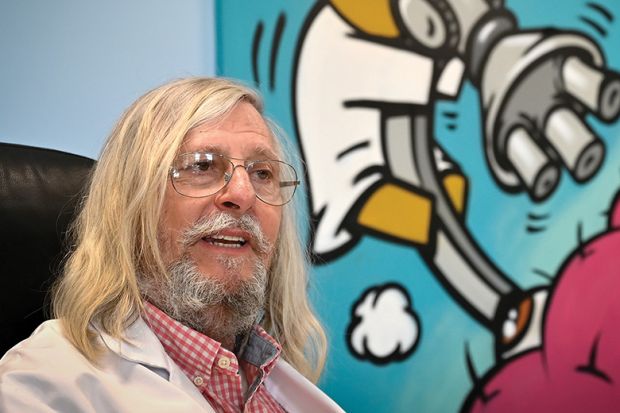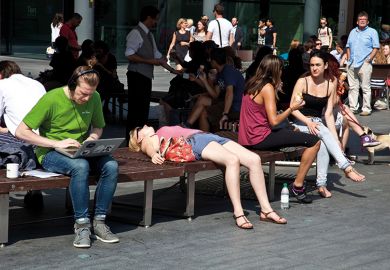It’s the research institute that stands accused of going rogue.
Since the beginning of the pandemic, the University Hospital Institute (IHU) Méditerranée Infection, an infectious disease research centre in Marseilles with an annual budget of tens of millions of euros, has become notorious in France because of the antics of its director, Didier Raoult.
He is the “populist” and once celebrated microbiologist best known for championing the drug hydroxychloroquine despite academics warning that there is no proof that it works against Covid-19.
The pandemic has jeopardised his reputation in the eyes of many scientists. And now there are questions over the future of his entire institute.
“It has lost so much, in terms of scientific dignity, that we hardly see how they could recover from this bad period,” said Pierre Tattevin, president of France’s Infectious Diseases Society, which has launched disciplinary action against Professor Raoult for allegedly misleading his patients over the effectiveness of hydroxychloroquine. Professor Raoult’s lawyer said that his client will be cleared.
Professor Tattevin described the Marseilles IHU as “like a sect”.
“The doctors that he’s hired in his institute are all people who believe in him as a god,” he said, claiming that researchers at the institute were either Raoult loyalists or afraid to speak out publicly.
A Le Monde report from inside the institute in December described it as Professor Raoult’s “fortress”, where staff defend him “tooth and nail”. The IHU is still reportedly treating Covid patients with hydroxychloroquine, despite France’s National Agency for the Safety of Medicines refusing in October to allow further use of the drug because of a lack of evidence that it works.
There is now an awkward silence from the IHU’s partners and financial backers. Times Higher Education contacted Aix-Marseille University, France’s National Research Agency (ANR), the Marseilles Public University Hospital System and the country’s Institute of Research for Development to ask whether they would continue to work with the institute. Only the ANR replied, and referred THE to the French government.
The IHU in Marseilles was one of six such institutes created from 2010 across the country to bring together researchers, companies and hospitals to strengthen France’s medical research. But since then there have been a series of warnings about Professor Raoult’s excessive power, a toxic working environment, and the IHU’s poor research practices.
In 2015, a report by a French government audit body sounded a warning about the “concentration of all powers” in the hands of Professor Raoult. It noted his “sometimes abrupt professional relations” with officials, doctors and researchers. Professor Raoult was both administrative and scientific director at the same time, an “unsatisfactory” state of affairs that does not exist in similar institutes in France.
The institute does have a scientific council made up of 13 external eminent French and foreign scientists. But at least two have been co-authors with Professor Raoult in the past, including the president, Laurence Zitvogel, an oncologist at LMU Munich. THE contacted several members, but none responded on the record.
In 2017, the institute faced further criticism that led to the withdrawal of two partners, the French National Centre for Scientific Research (CNRS), and the French National Institute of Health and Medical Research (Inserm).
A group of external researchers found a “lack of expertise” in a number of areas, including epidemiology, which led to poorly designed clinical trials, according to Mediapart, a French news outlet. In a “somewhat desperate” move, scientists from the institute had helped set up and edit a new journal to publish work that could not find a home elsewhere, they alleged.
A spokeswoman for Inserm confirmed that the IHU lost its certification in 2018 because “some of the research projects had not received a positive assessment” and “managerial issues had been identified”. A CNRS spokeswoman said that it had ended links in 2019, although she did not directly address the critical report.
In 2017 a group of unions CNRS.fr/sntrscgt/IMG/pdf/courrier-intersynd_22juin17_marseille.pdf">warned the government that staff in one of the research units in the IHU were “in danger”, and were being subjected to “shouting”, “insults” and “contempt”. There were also accusations of sexual assault, the unions said.
This history has not stopped Professor Raoult becoming a national celebrity in France, racking up more than 750,000 Twitter followers. He has railed against Parisian “elites” imposing restrictions on Marseilles, and become a hero to French anti-maskers.
Since the beginning of the pandemic, the IHU has overtaken Inserm itself to become the most watched health research authority on YouTube. Professor Raoult’s weekly to-camera musings regularly attract 1 million views. The institute has also continued to pump out pro-hydroxychloroquine YouTube videos by its other scientists.
The IHU and Professor Raoult did not respond to a request for comment from THE. On his Twitter feed, however, Professor Raoult points to other commended, non-coronavirus related research done by the institute. Privately, Professor Raoult’s defenders argue that his removal would violate academic freedom, and say that any failings over hydroxychloroquine pale in comparison with the bungled handling of the pandemic by many European governments.
But with Marseilles reportedly the centre of anti-vaccination sentiment in France, critics worry that Professor Raoult and his rogue institute have damaged trust in science.
“To be honest, he had quite great success in convincing the people, outside the medicine field,” said Professor Tattevin.
后记
Print headline: ‘Rogue’ research institute ‘has lost scientific dignity’





